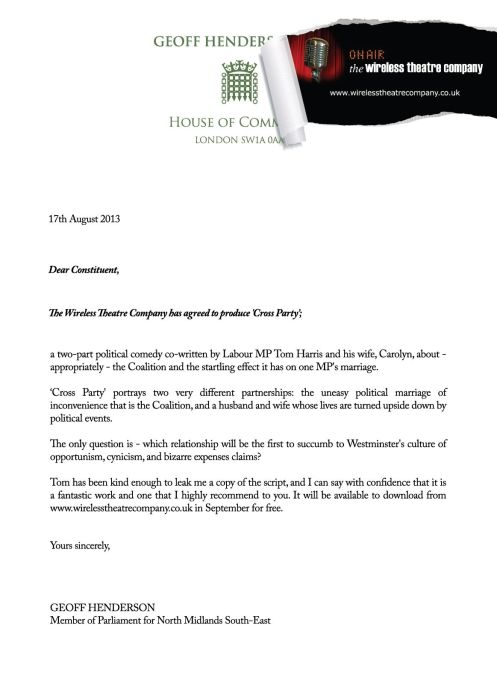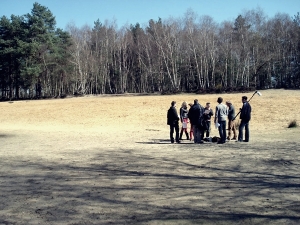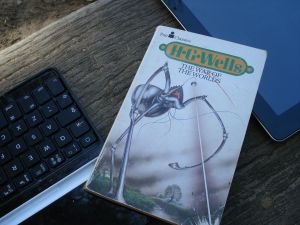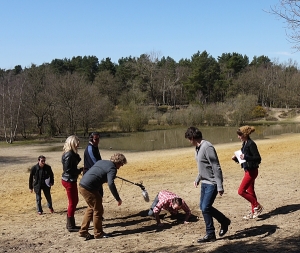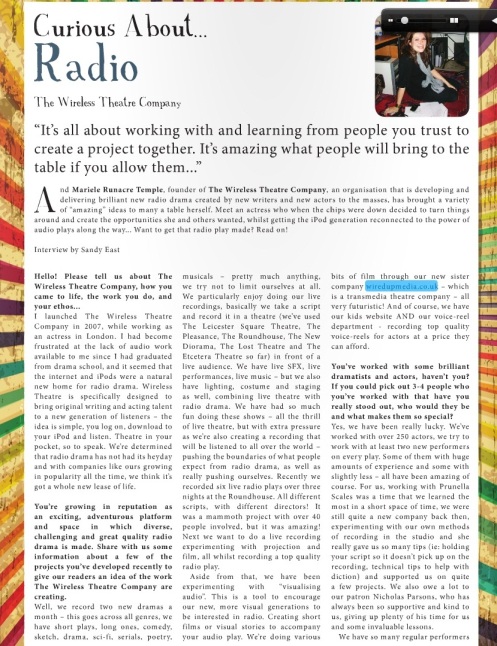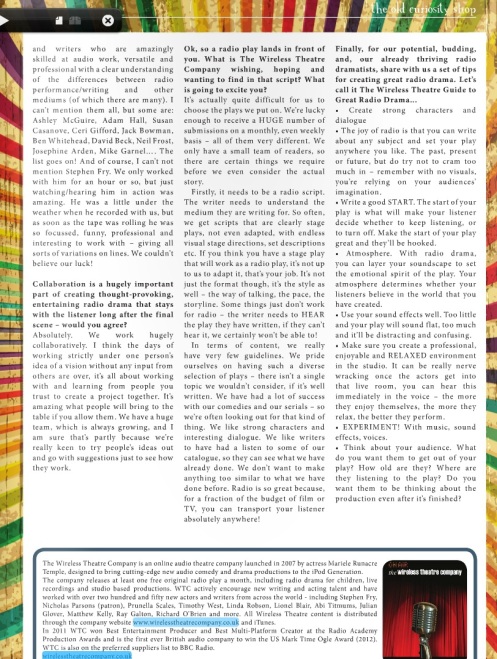It started out with a series of innocuous propositions: a semi-drunken chat between myself and Mariele Runacre Temple after our live show ‘Stage Fright’ – where I said we should have live cameras explaining the process that makes the sound. A coffee with Jack Bowman at the BFI – when he said we should enter a competition to remake the War of the Worlds broadcast. A one line e-mail from Arran Corbett – suggesting we enter a competition to make a SciFi film in 48hrs. And finally, a quick e-mail I knocked out over a coffee to Mariele, suggesting that we we do all the above in the same month and make a live show out of the results.
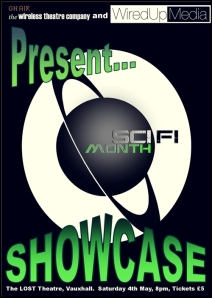 The best ideas start out small and simple and slowly and inexorably build until you realise, with a sudden terrifying jolt, that you and your team is at the head of something rather big and complicated, and that a lot of people are trusting you to get things right.
The best ideas start out small and simple and slowly and inexorably build until you realise, with a sudden terrifying jolt, that you and your team is at the head of something rather big and complicated, and that a lot of people are trusting you to get things right.
For me the jolt came in at the second pre-production meeting;
“We haven’t technically asked the people who own the place for permission to film” I said to my co-producer (and WiredUp Media’s video genius) Arran Corbett.
“We’ll have to bring them in past the concierge in discrete groups, how many crew members are there?” I imagined seven to eight.
“Fifteen” he replied “…and a shitload of kit”.
Over the course of SciFi Month we have used the talents of over twenty five people, their time and expertise was given for free, but on the implicit understanding that at the end of the process they would each have been part of a piece of art they could be proud of.
For that to be the case, each and every individual is relying upon on the next artist in the creative chain to do their job right, or all of their good work was for nothing. Its a significant pressure that is placed on everybody involved and the way people respond to it teaches you a lot about them.
I have learnt nothing but good things about the people who worked with us on SciFi month at every turn the effort and application of all involved was exemplary.
Nowhere was this more evident than on the first project in Sci Fi Month – White Noise. A film we made in just 48hrs for this competition – http://www.sci-fi-london.com/48-hour-film-challenge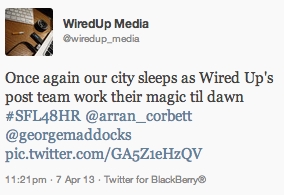
Making a film in 48hrs is not easy; There is precious little time for error or sleep (a poisonous combination as the chances of the former increase proportionally to the lack of the latter) and when errors do come, so often we see the best in people in their responses:
Jack Bowman (our lead actor) spectacularly fell over onto ridged concrete during a chase sequence, riddled with cuts and bruises he carried on for another six hours of shooting.
Seven hours into the edit our main editing programme developed a bug that rendered it useless. Our grader Neil Stenhouse took over the edit on his machine and worked tirelessly and diligently throughout the night until the job was done (a fourteen hour effort).
As this was happening the sound guys Timo Säilä and Marcin Kardach, who had expected to have their work done by midnight slept in and amongst a pile of equipment in the next room waiting to be woken up at 0600 the next morning when they could start. When they did awake and get cracking, their sound design was precise, detailed and artistically exceptional.
A big mention should also go to Francesco Quadraruopolo – he too was on standby the evening before waiting to score the piece. He worked until the small hours pre-preparing the music, then cat napped till we called him to prepare a final composition the next morning. His music was the final addition before we started to print the final film and it was amazing, at once both tongue in cheek and detailed and serious. Its a huge part of the overall piece, and an amazing piece of work for someone so deprived of time and sleep
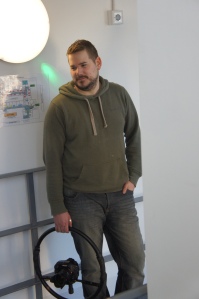 And in and amongst all this chaos was the one constant of the 48hrs film crew: Arran Corbett – he sourced the crew from nothing, he put the equipment together, shot the film, supervised and worked out the technical solutions that pulled us through when the edit failed and did all of this with humour and on four hours sleep powered by nothing but Red Bull and chinese. A heroic effort.
And in and amongst all this chaos was the one constant of the 48hrs film crew: Arran Corbett – he sourced the crew from nothing, he put the equipment together, shot the film, supervised and worked out the technical solutions that pulled us through when the edit failed and did all of this with humour and on four hours sleep powered by nothing but Red Bull and chinese. A heroic effort.
And that was just the crew! Long before they came to do their long sleepless work, an entirely different sort of commitment had been shown by the performers. From Tom Hunter who turned up on eight hours notice so he could be squeezed into a pair of latex pants covered in makeup and then left to lie on a bed surrounded by strangers. Or Jessica Dennis, who patiently and quietly sat at the location for five hours before we could shoot her scene and then brought the perfect performance. Or finally Josephine Arden who, dressed in nothing but the barest of latex clothing, ran around various public locations around London Bridge, ignoring the car horns, yells of security guards and groups of schoolchildren and then found the composure and professionalism to create a moment that turned the film on its head.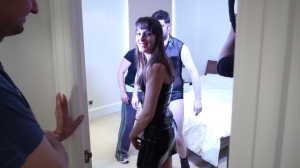
And there are more! Alissandro Ugo who pushed through the chaos to frame and light everything we needed. Claire Llewellyn whose focus and contribution started with the fights and then went well beyond to help smooth over all the physical business. Mo Corbett, who captured behind the scenes to make sure we will remember the day properly, Katrina Mayhew Taibe who went above and beyond the call of duty and kept us all going, and Nick Maddocks my long suffering brother and our ‘Soldier of Fortune’, someone who you can rely upon for whatever is needed, whenever it is needed.
In the end after 48hrs of elation, despair, laughter and more despair our submission for the competition was unceremoniously copied to a memory stick at 1222 (37mins from deadline) as I put on Arrans trainers (I knew I would have to run). I took the stick downstairs and into a cab.
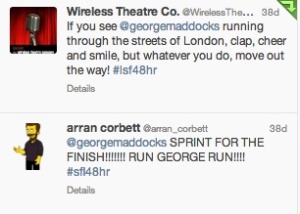 “I need to get to the BFI by ten to one” I told the cabbie,
“I need to get to the BFI by ten to one” I told the cabbie,
“That’ll be tight”, he said
“How much is it?'”I asked
“A tenner” he said.
“I’ll give you twenty if you get me there by ten to one” I said
“‘Hold on to your hat'” he laughed.
At five to one I did my sprinting impression through the doors of BFI and dropped the stick on the submissions desk – done.
Did we produce a film that does justice to all of these people commitment and dedication? You decide, its below.
WHITE NOISE
We are very proud. Of course, there are things we have learnt for next time, things we would do differently with hindsight and many many ways in which we can improve. We cannot wait for next time to put all these things into practice.
All of this was just the first weekend of SciFi Month – we still had all the hard work to do and we were exhausted.
Our next job was re-recording the War of the Worlds for this competition WAR OF THE WORLDS 75 and the live visualisation.
This time the pressure from our collaborators was subtly different, Wireless Theatre have been making radio drama for five years now. It what we do. We should get it right. Unlike White Noise (where just making a reasonable film would have been a decent achievement for a young company in its infancy) What people have come to expect from Wireless and audio is something absolutely exceptional.
As well as this we also had committed ourselves to filming a ‘visualisation’ of War of the Worlds.
Visualisation is a new concept in the audio world and explained here www.wiredupmedia.co.uk/#!blank/c9ok , it is where accompanying visuals are created for radio pieces. As we were going to have a audience sit and listen to the War of the Worlds radio play at the live event it was important that we should get this right.
We had two weekends, two massive projects to deliver and a live show happening the weekend after and we were all exhausted, It could have been a disaster.
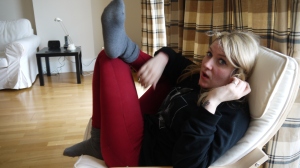 Luckily over the years Wireless has put together a team of people of highly skilled professionals who we can call on to help. We have a fearsome collection of people who work for us and this is all a result of the good works of Wireless’ Artistic Director, Mariele Runacre Temple.
Luckily over the years Wireless has put together a team of people of highly skilled professionals who we can call on to help. We have a fearsome collection of people who work for us and this is all a result of the good works of Wireless’ Artistic Director, Mariele Runacre Temple.
Mariele is going to edit this, and would subsequently cut all of the effusive praise I want to write and that she so richly deserves. So in its place I’m simply going to offer a anecdote. We are currently in the process of talks about funding the company with business professionals. The one things that amazes each and every one of them is how so much professional standard work can be made with no money, they simply do not understand how this can work.
What they don’t know is Mariele’s energy, enthusiasm and work ethic. She is passionate about the work, tireless in her efforts and is genuinely respectful and enthusiastic about helping each and every artist she can. Armed with nothing but this attitude and a great ear for art she has built the company from nothing, which is an enormous credit to her.
The two professionals who Mariele put her faith in to make the War of the Worlds piece happen were the award winning team who wrote it Robert Valentine and Jack Bowman (pen name Gareth Parker) –
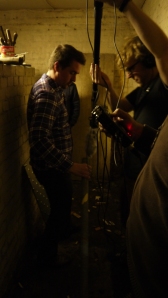 Rob, was a absolute rock, time and time again I would find myself having run out of time or without the ability to make something work and he would simply step in and cover the work without fuss or complaint. Its hard to convey how much of this project only happened because of his amazing work ethic and diligent focus on getting the job done.
Rob, was a absolute rock, time and time again I would find myself having run out of time or without the ability to make something work and he would simply step in and cover the work without fuss or complaint. Its hard to convey how much of this project only happened because of his amazing work ethic and diligent focus on getting the job done.
Jack (now recovered from his lacerations) used his contacts, he’s a prolific networker, to put together the cast and (via the wonderful Mary Burt) a pub location where we could shoot (massive thanks to Sarah and Adrian from The Crown Pub who were wonderful to us!) Rob scouted out Horsell Common and handled logistics and with Mariele on the actors liaison, before we knew it we were at Woking station at 0830 in the morning with two bags full of kit and a full team of actors.
And what a team of actors! On-location recording is a very different thing from studio recording. The actor not only has to keep in mind keeping themselves safe and upright (stumbling in and around over treeroots and in and around the sandpits of the common) but also their proximity to the mic and each other. Once they’ve done all that they have to act as well. It is a precise and demanding discipline, made even more difficult by the fact that the weather was beautiful and the common full of people shouting, barking dogs and phones going off. If we caught any of those things on the recording the take was ruined. In this environment a relative period of silence becomes so precious, it is your one chance to get that scene, if you nail it you will have it forever, miss it and you may never get another chance.
The team we had that day took every one of the few chances we were given. Josie Arden returned and brought the same physical and emotional precision she gifted us on White Noise. She was joined by Tom Slatter who scrabbled and crawled around the common to like a trooper before composing himself to give the final moments of the play a exquisite tenderness. Matt Blair, making his acting debut brought what we needed, on-time, every time and Matthew Hebden ably striding around the common in the morning, spent the afternoon crouched in a filthy cellar pushing himself and Josie to find the harrowing performances the piece required.
All of the above brilliant work would have been for nothing, had it not been for the pointed focus and concentration of the man who truly made Dead London work. Malcolm Thorp. A longstanding editor for Wireless with a reputation for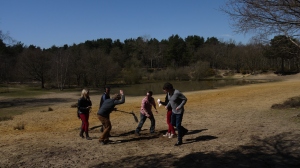 immaculate post-production work, he brought all of that focus to the location recording and over an ten hour recording session didn’t miss a trick.
immaculate post-production work, he brought all of that focus to the location recording and over an ten hour recording session didn’t miss a trick.
LOCATION RECORDING VIDEO
With the audio safely recorded Malcolm took himself away to edit, and we all met up at Woking station the next weekend to record the visualisation of the audio.
Arran Corbet re-joined us as did the tried tested and thoroughly reliable Tom Slatter. Jack and Rob were a given and we were subsequently joined by two more performers – Jane Deane and Cameron K McEwan. Within forty minutes we had blown green smoke in Camerons face covered him in fake blood and dragged him around the floor of the pub. Jane had a slightly more leisurely time getting through a full two hours before we made her crawl around in and amongst bins. They did so without complaint and with full commitment to the roles – a great credit to them both.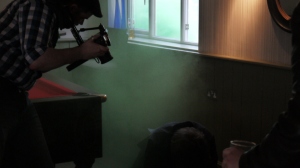
The most telling anecdote I can offer for the weekends recording was this. We were using green pyrotechnic smoke to convey the Martians, and we could only afford three smoke pellets. This meant that we had one take and one take only to get each shot right.
We didn’t miss a shot, we nailed each one, and in all honestly the final two minute shot that we filmed is easily the best work we’ve committed to hard drive a clear indication of team that, although fatigued, was becoming frighteningly efficient.
I remember thinking on the drive back to London, ‘all thats left is the live show’, and then almost immediately being sized by the fear of that. The live show was possibly the most complicated and pressurised environment of the whole month.
Firstly, both of the pressures present in the above pieces were in evidence. The pressure from the performers to do their performances justice and secondly the pressure to do better than the very high standard set by previous Wireless shows.
Thirdly, the live mixing and integration into the performance of four live video feeds, explaining and clarifying the process’ by which the sound was made and recorded. Something we had never done before, and that (to our knowledge) has not been done by a theatre company before.
And finally the worst pressure – a live audience ready to see any mistake, making it impossible to cut and track back or edit the mistake later.
Its impossible to list all the little acts of hard work, dedication and ingenuity that made the live show work – there were too many. From all night edits, carried on during train journeys to and from day jobs, to people learning the intricacies of vision mixin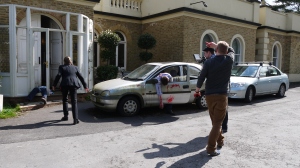 g in two hours, improvised projection shutters made from gaffer tape and notebooks. Those people who had already worked so hard to deliver White Noise and War of the Worlds, doubled down and put in a final push.
g in two hours, improvised projection shutters made from gaffer tape and notebooks. Those people who had already worked so hard to deliver White Noise and War of the Worlds, doubled down and put in a final push.
To help we were joined by fresh eyes and ears. Erica Basnicki and Tshari King, Wireless Theatre’s audio experts had a huge weight on their shoulders. Exhausted from the first three weeks of the work my briefings were patchy and unfocused. They, quite simply, made great decisions, crafted the audio and made the sound work by themselves. Its a mark of their talent that I didn’t cut a single sound or que. They simply got it right, first time. Incredible professionalism and talent that was supported with precision and confidence by Dimitar Angelov – whose operation was rock solid.
The same is true of the lighting work by Gareth Brown – again my briefing was about as rough and messy as could be imagined.
“Backlight, with big parcans Gareth and some blue” I think I managed. From that scarily brief starting point Gareth turned up got the kit in and got the thing lit just right in three hours – brilliant work.
But all the tech in world counts for nothing unless what is onstage is right and into this chaos of wires and technicians shouting things no-one but other tecncians understand five actors had to perform two radio plays perfectly.
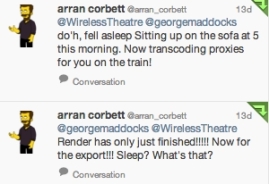 We retained wonderful Jessica Dennis, who was as professional and accomplished as she was on White Noise. We gained Neil Frost and David Beck who worked as comedy duo to great effect, farting and burping their way through Space Ladz with alarming precision. Andrew Macbean given a subtle role that needed great focus and delicacy of touch which he brought in spades and Daniel Rodrigues who had to span the bridge between gross humour and delicate emotion in the two pieces and do so with aplomb.
We retained wonderful Jessica Dennis, who was as professional and accomplished as she was on White Noise. We gained Neil Frost and David Beck who worked as comedy duo to great effect, farting and burping their way through Space Ladz with alarming precision. Andrew Macbean given a subtle role that needed great focus and delicacy of touch which he brought in spades and Daniel Rodrigues who had to span the bridge between gross humour and delicate emotion in the two pieces and do so with aplomb.
The ever dependable Adam Hall compared the evening with wit and charm and Ally Friedman stepped boldy forward and became the most visible foley person we had ever had performing with as much confidence and precision as the actors themselves.
Within a couple of hours, SciFi Month was finished, we stripped out the cable runs we had put in just the night before, packed up the laptops and headed for the bar to celebrate what had been a audacious month.
Its not in the moment after you finish making something that you understand it. Its not even in the next few days. It comes later, you remember a single detail, then think of the circumstances that led to it and then trace back what happened from there. Every time I go through that process with SciFi month, I am amazed by all the work that people did so well, all the times they could have got it wrong and didn’t, all the times that people went above and beyond what was expected of them.
This piece is intended to serve as the second best thank you that Wireless and WiredUp Media can manage to everyone involved.
The best thank you, I would hope, would be the work itself.
Dead London will be entered into the War Of The Worlds 75 Competition on June 1st and will be available to download from the Wireless Theatre Website shortly afterwards. Space Ladz and Time Travel Incorporated will be online next month.
Posted in Uncategorized
Tags: 48 hour sci-fi film challenge, filmmaking, Horsell Common, Location Recording, Radio Drama, theatre, Visualising Audio, War of the Worlds








